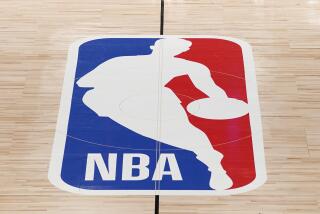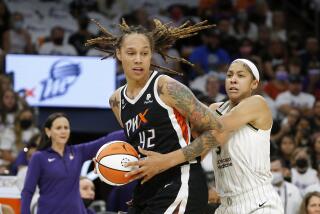NBA Is Facing Hard Labor
- Share via
The NBA, which had always held fast while other leagues marched themselves into the drain, on Tuesday joined the prevailing procession of professional sports:
Intense fan interest. Big money. Struggle to divide the cash. Labor unrest. Canceled games. Outraged fans. Numbing negotiation sessions.
And, eventually and tortuously, a dimming interest in the sport itself.
In the long view, as even NBA Commissioner David Stern seemed to hint, this confrontation--and the NBA’s cancellation of the first two weeks of the season--falls right into place with the other bitter labor struggles of the past 15 years. It could could place the NBA, which has been experiencing a decade-long boom, in the same sullied situation as the other labor-blighted sports.
* In 1987, NFL players went on strike after the first week of the season, fighting for looser free-agent rights and other issues.
The NFL canceled Week 2 games, then put together replacement teams for three games, which all counted on the teams’ records, until the regular players returned to work.
Labor peace wasn’t made until the union won several court decisions granting greater free-agent rights, but there have been no disturbances since.
* On the heels of one of its most entertaining and successful postseasons, the NHL locked out its players for the first two months of the 1994-95 season in a struggle over free-agent rights and other issues.
* In 1994, a labor battle over a broad range of issues forced baseball to shut down in the middle of the season and cancel the World Series.
The shutdown devastated major league baseball and opened a rift with the fans that many believe was not healed until Mark McGwire and Sammy Sosa relighted the passion with their demolition of Roger Maris’ 37-year-old home run record.
At the end of a long day Tuesday and the beginning of an NBA nightmare scenario, Stern suggested the NBA’s canceling of regular-season games might have been unavoidable.
“Maybe historically,” Stern said, “this day was inevitable.”
Stern was specifically referring to a path taken since the 1995 labor agreement was torn asunder by a handful of powerful agents and players.
Everything since then, Stern said Tuesday, has led to the current lockout brinkmanship, which jeopardizes the entire 1998-99 season.
“I’m not going to say I’m sympathetic toward the owners,” Miami Heat center Alonzo Mourning said. “Most of them are billionaires, and the others aren’t too far behind.”
In 51 years of existence, the NBA staged 35,001 games without a cancellation.
Said Russ Granik, deputy commissioner: “We basically have lost about a 12th of our regular-season and I think that probably equates to about $85 million in players’ salaries which basically are lost.
“I don’t think that will ever be made up. . . . Maybe we make a few dollars of it. But for the most part I think it’s lost.”
The NBA ended two previous lockouts--in 1995 and 1996--before any games were canceled.
Is the NBA, which at least peripherally benefited from each of those other sports’ previous labor meltdowns, headed for a bleak and bitter period? Will the bond between fan and sport break apart?
“The honest answer to that is we may just do that, whether it’s one game or an entire season,” Stern said last week.
“The only thing we can say to you is that if you’ve got a business where it’s costing you more to make the product than you’re getting for selling it, then you have to suffer the consequences of trying to put those things in balance.
“And that’s where we are. All we would do is beg for the indulgence of those who follow us.”
* MAIN STORY: A1
More to Read
Go beyond the scoreboard
Get the latest on L.A.'s teams in the daily Sports Report newsletter.
You may occasionally receive promotional content from the Los Angeles Times.










